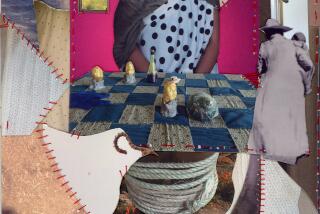Discoveries: ‘Dickinson: Selected Poems and Commentaries’ by Helen Vendler
- Share via
Dickinson
Selected Poems and Commentaries
Helen Vendler
Harvard University Press: 530 pp., $35
I’m just a regular reader, you say. I read for pleasure. Why should I read the commentaries of critic Helen Vendler on the “epigrammatic, terse, abrupt, surprising, unsettling, flirtatious, savage, winsome, metaphysical, provocative, blasphemous, tragic, funny” poems of an isolated New England poet? I know, I know. First, Emily Dickinson is the sorcerer’s stone. Her poetry contains, no, is, the most essential, passionate use of English and the most essential, passionate connection between the English language and nature (our nature, birds and bees nature, God’s nature). So you’ve got to plant her somewhere in your garden, even if it’s a tiny corner with no sun. Second, while commentary on poetry is rarely a good idea, Dickinson’s spare use of words are just the tip of her iceberg; the waters below contain so many secrets that it truly helps to have a guide to the meter, the myth, the thread of dreams. Third, if you’re going to hire a guide, you may as well have the best, and Vendler is the best. It’s like, I don’t know, reading Virginia Woolf on Alice Munro; it’s like Brillat-Savarin on Alice Waters, it’s like Leonardo da Vinci on Robert Motherwell. Life is short. Go to the top.
Dreaming in Chinese
Mandarin Lessons in Life, Love, and Language
Deborah Fallows
Walker & Co.: 205 pp., $22
“This book is the story of what I learned about the Chinese language, and what the language taught me about China.” This is exactly how simply and clearly Deborah Fallows, a veteran traveler, wife of James Fallows (journalist and Asian specialist), untangles the complex relationships between a visitor to another culture, a language and the culture of the country she is visiting. Fallows has a good ear for aspect, the way of stressing certain words and syllables to change or add layers of meaning to a simple word or phrase. She veers to the gentle, seeing the generosity behind brusque gestures, the intimacy and friendship behind rudeness and the priorities that language reveals. Playfulness, respect, affection and the virtues of solidarity with the common people — a different traveler might miss all these but not Fallows. In her effort to understand the real people of China, she finds herself looking for bargains, shopping at a drugstore (its nickname is “the pricekiller”) and a Shanghai Walmart. In the frenzy for bargains, Fallows catches herself dreaming in Mandarin, returning home victorious with three giant jars of mustard, this close to dragging a couple of questionable free pork shanks back to her apartment on the 22nd floor.
Salter Reynolds is a writer in Los Angeles.
More to Read
Sign up for our Book Club newsletter
Get the latest news, events and more from the Los Angeles Times Book Club, and help us get L.A. reading and talking.
You may occasionally receive promotional content from the Los Angeles Times.







